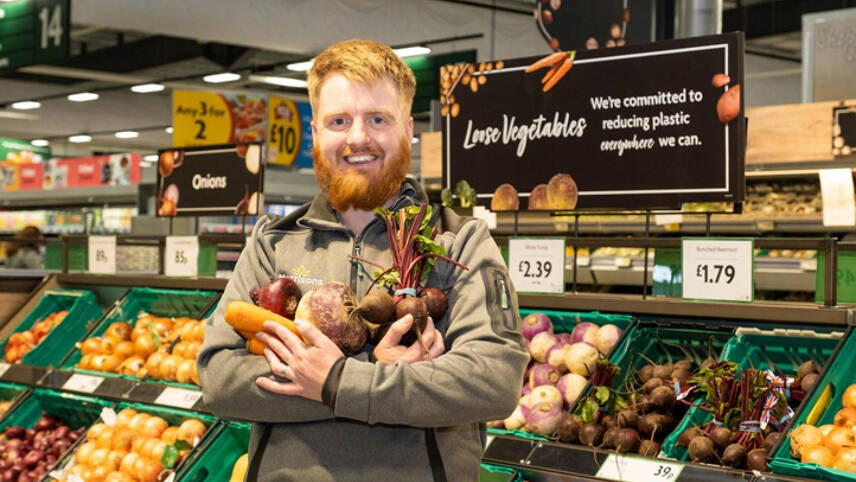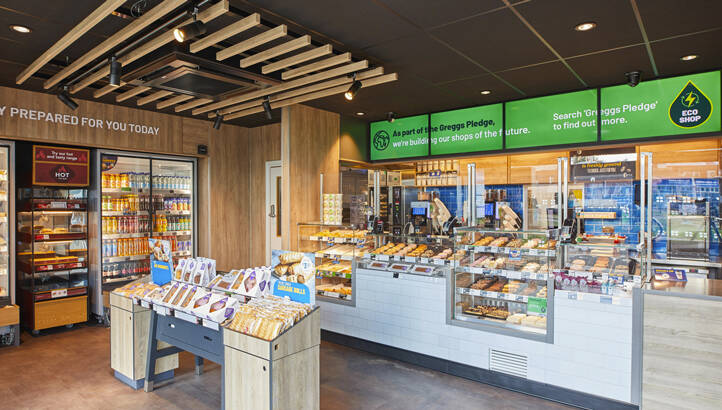Register for free and continue reading
Join our growing army of changemakers and get unlimited access to our premium content

Image: Morrisons
Morrisons demolished its original store in Little Clacton, Essex, last year due to structural problems, local news reports. The redesigned store on the same site was opened this week, with the supermarket describing it as “innovative” and “low-impact”. 99% of the demolition materials from the old store have been used in building the new store, Morrisons claims.
Built-in sustainability features at the store include a rooftop solar array, which will generate enough electricity to meet 20% of the store’s needs. The remaining needs will be met through a renewable electricity contract. To reduce emissions from heating, Morrisons has installed air-source heat pumps which are connected to pipes served by waste heat generated by fridges. The store also purports to be more energy-efficient than its predecessor.
On resources, the store has its own back-of-house recycling system. It has also been kitted out with a rainwater harvesting system. The collected water will be used in toilet flushing.
Morrisons estimates that the new store will generate 43% less carbon dioxide annually than its predecessor. It is also promising “almost zero waste” across the building life-cycle. Morrisons as a corporate is notably targeting net-zero operational carbon emissions from operations by 2035 and aims to recycle all its waste by 2025.
Customers will also see changes regarding the sustainability of the products and services on offer. 20 electric vehicle (EV) charging points have been added to the store’s car park, for example. In the aisles, customers will be able to choose from more than 350 loose, packaging-free products – making the store the home of Morrisons’ widest range of plastic-free products.
Also on offer are more than 200 locally sourced products. Morrisons announced earlier this year a commitment to only source from farms certified as net-zero when sourcing products and ingredients from British suppliers.
Store manager Paul Tracey said the site “ brings together all of the environmental and social initiatives we have created to date under one roof”.
Sustainability, steak bakes and sausage rolls
Also this week, food-to-go giant Greggs has opened what it is calling its first ‘Eco-Shop’, which will be used to test technologies and processes that could reduce the environmental impact of store operations.

Image: Greggs
The shop, in Great Billing in Northampton, has been kitted out with ovens, fridges and dishwashers and which should bring about energy savings.
The new ovens claim to use up to 10% less energy than other models and to cook products faster; the new fridges could require up to 50% less energy than their predecessors and the new dishwasher uses 50% less water and 60% less chemicals than the current model used in most of Greggs’ 2,000+ stores.
Also set to improve energy efficiency at the store is solar control, double-glazed glass. This should, Greggs claims, reduce the use of air conditioning by shielding the store from much heat from the sun. Greggs is, additionally, installing phase change materials capable of capturing and releasing heat as necessary.
On resources and waste, the shop has customer toilets that are air-assisted, which will reduce water use. It is also fitted with recyclable flooring made using 20% recycled content.
Less has been said, at this stage, about whether the products on offer will be any different in the name of sustainability. After launching popular vegan versions of many of its products, including the iconic sausage roll, Greggs is exploring eco-labels for a broader range of items, the firm’s first head of sustainability Paul Irwin-Rhodes told edie last December.
Greggs has stated that it will use learnings from the ‘Eco-Shop’ to decide which technologies to install across its broader shop estate.
Greggs is notably a member of the British Retail Consortium’s roadmap to net-zero operations by 2035 and value chains by 2040. It is aiming to back these longer-term commitments up with verified science-based targets this year.


The largest form of fossil free fuel that many companies have on their doorstep is the waste heat energy from refrigeration equipment. Using a heat recovery system it is possible to produce 20litres of hot water from every 1kW of rejected heat. Leaving the hot water boiler with very little to do, in fact over 85% less work do do. Small and large users of hot water need to take note of this simple solution that we have been manufacturing in Germany for over 45 years, have a look http://www.dkheatrecovery.co.uk